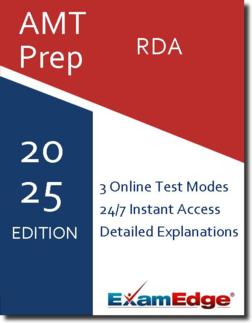AMT RDA (RDA) Practice Tests & Test Prep by Exam Edge - FAQ
Based on 34 Reviews
- Real Exam Simulation: Timed questions and matching content build comfort for your AMT RDA test day.
- Instant, 24/7 Access: Web-based AMT Registered Dental Assistant practice exams with no software needed.
- Clear Explanations: Step-by-step answers and explanations for your AMT exam to strengthen understanding.
- Boosted Confidence: Reduces anxiety and improves test-taking skills to ace your AMT Registered Dental Assistant (RDA).

Why should I use Exam Edge to prepare for the AMT Registered Dental Assistant Exam?
FAQ's for Exam Edge AMT Registered Dental Assistant practice tests
- Comprehensive content: Exam Edge's AMT Registered Dental Assistant practice tests are created specifically to prepare you for the real exam. All our AMT RDA practice test questions parallel the topics covered on the real test. The topics themselves are covered in the same proportions as the real test too, based on outlines provided by the American Medical Technologists in their AMT RDA test guidelines.
- Realistic practice: Our AMT RDA practice exams are designed to help familiarize you with the real test. With the same time limits as the real exam, Our AMT practice tests enable you to practice your pacing and time management ahead of test day.
- Detailed explanations: As you complete your practice tests, we show you which questions you answered correctly and which ones you answered incorrectly, in addition to providing you with detailed step-by-step explanations for every single AMT Registered Dental Assistant practice exam question.
- Performance insights: After you complete a practice test, we provide you with your raw score (how many you answered correctly) and our estimate of the AMT RDA score you would have received if you had taken the real test.
- Ease of access: Because all Our AMT practice tests are web-based, there is no software to install. You can take AMT RDA practice exams on any device with access to the internet, at any time.
- Flexible use: If you must pause while taking one of Our AMT practice exam, you can continue right where you left off. When you continue the test, you will start exactly where you were, and with the same amount of time you had remaining.
- Thousands of unique questions: We offer 20 different online practice exams with 2,800 unique questions to help you prepare for your AMT Registered Dental Assistant !
- Low cost: The cost of ordering 5 practice tests is less than the cost of taking the real AMT RDA test. In other words, it would be less expensive to order 5 practice tests than to retake the real AMT Registered Dental Assistant exam!
- Our trusted reputation: As a fully accredited member of the Better Business Bureau, we uphold the highest level of business standards. You can rest assured that we maintain all of the BBB Standards for Trust.
- Additional support: If you need additional help, we offer specialized tutoring. Our tutors are trained to help prepare you for success on the AMT Registered Dental Assistant exam.
What score do I need to pass the AMT RDA Exam?
To pass the AMT Registered Dental Assistant test you need a score of 400.
The range of possible scores is 100 to 900.
How do I know the practice tests are reflective of the actual AMT Registered Dental Assistant ?
At Exam Edge, we are proud to invest time and effort to make sure that Our AMT practice tests are as realistic as possible. Our practice tests help you prepare by replicating key qualities of the real test, including:
- The topics covered
- The level of difficulty
- The maximum time-limit
- The look and feel of navigating the exam
Do you offer practice tests for other American Medical Technologists subjects?
Yes! We offer practice tests for 7 different exam subjects, and there are 100 unique exams utilizing 10800 practice exam questions. Every subject has a free sample practice test you can try too!
AMT - Laboratory
AMT Certified Medical Lab Assistant (CMLA)
Practice Tests
AMT Medical Laboratory Technician (MLT)
Practice Tests
AMT Medical Technologist (MT)
Practice Tests
AMT Registered Phlebotomy Technician (RPT)
Practice Tests
AMT - Medical and Dental Office
AMT Certified Medical Administrative Specialist (CMAS)
Practice Tests
AMT Registered Dental Assistant (RDA)
Practice Tests
AMT Registered Medical Assistant (RMA)
Practice Tests
To order full-length tests, or take a sample test, for a different subject:
Click on ' Name on the Exam Name' You will be take to the orders page
How do I register for the real American Medical Technologists?
For up-to-date information about registration for the American Medical Technologists, refer to the American Medical Technologists website.


